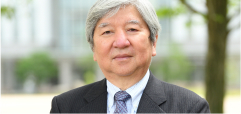新着情報NEWS
岐阜新聞 真学塾㉛ 教育学部 英語専修 Spiri John
The Key Ingredient for Learning English
岐阜聖徳学園大学教育学部准教授 英語専修 Spiri John
The Key Ingredient for Learning English
What do you think is most important when learning a second language? Is it having a good teacher? Talent? A chance to use the latest technology? More important than factors like those is motivation.
Imagine two situations. One, Teacher A is the greatest teacher in the world but her class of 20 students is completely unmotivated. They don't care about learning English at all. Two, Teacher B is the worst teacher in the world but her class of 20 students is highly motivated. Which class will learn more? I think Teacher B's class will learn more. Even if the material is too easy or too difficult, the B class students will find a way to learn.
But not all kinds of motivation are created equally. The two kinds of motivation are extrinsic--the motivation that comes from outside a person--and intrinsic--motivation that comes from inside a person. Which do you think is better? Let me explain each in greater detail first.
Extrinsic motivation comes from outside sources. A good example is a student who wants high test scores to satisfy her parents. This student wants her parents to praise her; she wants her teacher to acknowledge her effort in front of the class. Knowing that others will treat her kindly makes the student study harder. The desire to win an award or someday get a good job are also examples of extrinsic motivation.
Intrinsic motivation, on the other hand, comes from within a person. Maybe a student plans to study abroad, enjoys learning foreign languages, or just wants to improve his English for his own satisfaction. Even if no one else notices his improved English, he will still study hard.
Although both extrinsic and intrinsic motivation can lead to better learning results, intrinsic is considered better. What happens when the favorite teacher of an extrinsically motivated student is replaced by someone the student finds less interesting? The extrinsically motivated student will lose his motivation. The same thing will happen to students who stop receiving praise, stickers, or gold stars. Extrinsic motivation methods might work for a little while, but in the long run, they fail.
As you might imagine, it's a little harder for a person to become intrinsically motivated. And there is not as much a teacher can do to help a student become intrinsically motivated. One key is curiosity. Curiosity is the desire to know and to learn. Curious students tend to be more motivated than students who don't care.
Attitude can also help a person become intrinsically motivated. A student with the right attitude will look for the enjoyable aspects of an activity instead of focusing on aspects he doesn't like. Making goals helps as well.
Please find as much motivation as you can so you can learn a language more proficiently and enjoy using the language sooner. The power to become more motivated is in your hand and in your heart!
- 教育学部【お知らせ】
- 教育学部【イベント】
- 教育学部【公開講座】
- 外国語学部【お知らせ】
- 外国語学部【イベント】
- 外国語学部【公開講座】
- 経済情報学部【お知らせ】
- 経済情報学部【イベント】
- 経済情報学部【公開講座】
- 看護学部【お知らせ】
- 看護学部【イベント】
- 看護学部【公開講座】
- 人文学部【お知らせ】
- 人文学部【イベント】
- 短期大学部【お知らせ】
- 短期大学部【イベント】
- 大学院【お知らせ】
- 大学院【イベント】
- 大学院【公開講座】
- 図書館【お知らせ】
- 図書館【イベント】
- 図書館【公開講座】
- 図書館【在校生】
- 情報教育研究センター【お知らせ】
- 情報教育研究センター【イベント】
- 情報教育研究センター【公開講座】
- 教職教育センター【お知らせ】
- 教職教育センター【イベント】
- 教職教育センター【公開講座】
- 教職教育センター【在校生】
- 経済情報研究所【お知らせ】
- 経済情報研究所【イベント】
- 経済情報研究所【公開講座】
- 仏教文化研究所【お知らせ】
- 仏教文化研究所【イベント】
- 仏教文化研究所【公開講座】
- 仏教文化研究所【在校生】
- 仏教文化研究所【法話】
- DX推進センター【お知らせ】
- 地域・社会連携センター【お知らせ】
- 地域・社会連携センター【産官学連携】
- 地域・社会連携センター【高大連携】
- 地域・社会連携センター【イベント】
- 地域・社会連携センター【公開講座】
- 地域・社会連携センター【在校生】
- 子育て支援センターくれまちす【お知らせ】
- 国際交流【お知らせ】
- 国際交流【イベント】
- 入試情報【お知らせ】
- 入試情報【イベント】
- 学生生活【お知らせ】
- 学生生活【イベント】
- 学生生活【公開講座】
- 就職・キャリア【お知らせ】
- 就職・キャリア【イベント】
- 就職・キャリア【公開講座】
- 就職・キャリア【在校生】
- SDGSへの取り組み【お知らせ】
- 学生支援センター【お知らせ】
- 学生支援センター【イベント】
- サークル【お知らせ】
- ステークホルダー【受験生の方へ】
- ステークホルダー【社会人・一般の方へ】
- ステークホルダー【卒業生の方へ】
- ステークホルダー【在校生の方へ】
- ステークホルダー【保護者の方へ】
- ステークホルダー【企業・教育関係者の方へ】
- ステークホルダー【プレスリリース】









